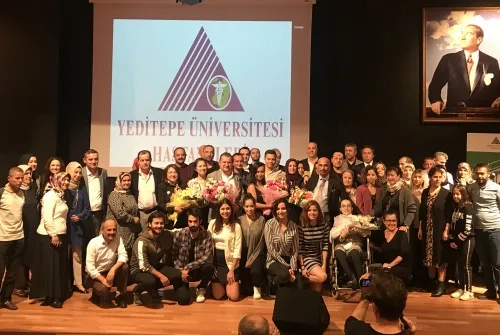Alo Yeditepe
Alo Yeditepe
There is Still a Lot of Misconception About Organ Donation
According to the data of the Ministry of Health, a total of 24,819 people including 21,551 kidneys, 2093 liver, and 918 heart patients out of 60,000 dialysis patients in Turkey are on the organ waiting list. According to Turkish Nephrology Association 2017 records, 10,098 people died in dialysis in 2017 alone. This equates to an average of 28 patients per day. Within the scope of Organ Donation Week, Yeditepe University Hospitals organized a meeting named '' Life Is The Most Beautiful Gift,’ aiming to raise awareness on the subject.
In the meeting where patients waiting for organ donation and transplantation came together, Yeditepe University Hospitals General Surgery Specialist and Yeditepe University Internal Medicine Department Head, and Nephrology Specialist Prof. Dr. Gülçin Kantarcı also took part as a speaker.
Emphasizing that although there has been a lot of progress in organ donation in Turkey, unfortunately, many things are still misunderstood, our physician: "The organs of the person who has brain death are not allowed to be donated by families due to misperception. Because of the confusion between coma and brain death, people have a concern: ‘Could s/he have recovered even though s/he was said to be dead?' There is no such reality. Organ donation is already out of the question for the person hospitalized with the diagnosis of coma.”
Stating that the number of kidney transplants performed in Turkey has started to exceed 4000 in a year, our expert also added: "The largest patient group is in the kidney. In terms of Turkey's position, success, and numbers, we can say that we are in a very important place in the world in liver transplantation. In the liver, the second most transplanted patient group, the limit of 1500 was exceeded, and when the number of transplants performed annually was examined on this scale, it forced 6000."
The Difference Between Coma and Brain Death
Stating that the perception of brain death in Turkey is wrong, our expert: “Since coma and brain death are confused, people have a concern as follows: ‘Could s/he be cured even though s/he is said to be dead?' There is no such reality. Organ donation is already out of the question for the person hospitalized with the diagnosis of coma. We know that a coma is a condition that can heal over a long period, but brain death is a diagnosis with definitive diagnostic criteria. It is not a diagnosis based on personal opinions, and when this is detected, we may face the following possibility: At the point where life ends, we will choose to save other people's lives. We will save the patients who are waiting in hope, who do not have a donor, and who are organs to be donated from those who lost their only chance of life. They will commemorate the person who lost his life with mercy as they continue their lives.
Organ Recipients Can Also Become Donors
Recommending that those who are waiting for organs and their families should be donors first, Nephrology Specialist Prof. Dr. Gülçin Kantarcı: "In order to reduce stress during the organ waiting process, especially those with renal failure should try to spend their non-dialysis time more efficiently and strive for those who are waiting for organs. This will further reduce their distress in them. Apart from that, I recommend that they do not break away from active life. As long as they are in life, they should participate in all the social responsibility projects they can do or direct themselves to the jobs they can do. Those who are waiting for an organ can also donate an organ. Because life is a gift. I encourage them to support organ donation campaigns and volunteer.''
21-Year-Old Dilek Has Been Waiting for a Kidney for 5 Years
Dilek Gençyılmaz, 21, who was determined to have congenital kidney smallness when she went to the health center with the complaint of abdominal pain and waited for a kidney transplant for about 5 years, said:
“Since my family has diabetes patients, they cannot be transplanted. I am waiting for the cadaver. My family is with me, of course. At first, I was very bad, my psychology was really turned upside down, but the greatest doctor of all is himself. I became my own doctor. One cannot really understand this situation until it happens to him/her. Many people do not donate organs, but there are also people who lose their lives while waiting for a transplant.''
Her Mother Once Again Gave Life to Her Daughter
Tülay Fırat, 42, who was diagnosed with chronic kidney failure in 2012 and resumed life with the kidney she received from her mother, said, "It was a coincidence in the tests made as a result of other disorders I have experienced. It is actually a disease I have had since I was a kid. But we were able to diagnose it at a later stage. It continued this way from 2002 to 2012. A birth intervened. After that, my situation got worse. My blood pressure was constantly rising. Accordingly, I had acute kidney failure, and that year I was told that I needed a kidney transplant and that I needed dialysis in the process. However, in this process, I held on to life again as a result of the transfer from my mother with the support of my family and their desire to be a donor. I was one of the lucky patients. I was transferred without dialysis. It has been seven years. I am very healthy now.
Press Coverage: gazetevatan.com | haberturk.com | yeniakit.com | aa.com | gunes.com | aydinlik.com
About
Faculty and Year of Graduation:
Uludag University Faculty of Medicine 1984-1990
”
See Also
- What is Hypoglycemia?
- Common Misconceptions About Kidney Transplantation
- Kidney Diseases and Treatment Methods
- 10 Questions About Kidney Transplantation
- How Should the Daily Salt Consumption Amount Be?
- Misconceptions About Hypertension
- Chronic Kidney Disease and Treatment Methods
- What is Hypertension?
- Things Wondered About Kidney Transplantation and Organ Donation
- If You Consume More Than 5 grams of Salt...
- The Frequency of Hepatitis Seen in Dialysis Patients Is Decreasing
- 12-Year-Old Tuğba Nur Survived with Transplant
- Excess Protein Does Not Increase Muscle Mass, and It Impairs the Kidneys
- AV FISTULA Should Be Done At The Right Time For Hemodialysis Patients
- Pay Attention to Kidneys in Pregnancy!
- He Held On To Life with His Brother's Kidney
- Recommendations to Strengthen the Immune System
- Kidney Failure Caused by Ear Obstruction
- He Lost 20 Kilograms in 40 Days for His Wife
- One Out of Every Seven People Has Kidney Disease
- How Should Kidney Patients Be Protected From COVID-19 Coronavirus?
- What is Propolis? How to Use Propolis?
- Improper Nutrition Invites Kidney Failure
- Important Warning from the Expert: “Not Adding Salt to Meals Alone Is Not Enough”
- Tissue Harmony Is Also Important for Success in Kidney Transplant
- Phytotherapy and Immune System
- Hereditary Kidney Diseases Are Underrecognized!
Alo Yeditepe




